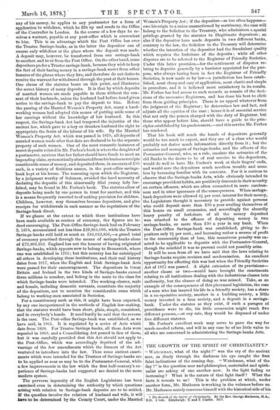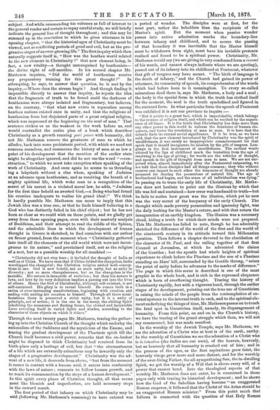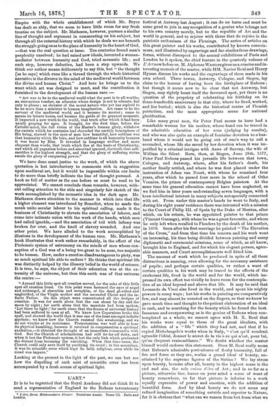THE GROWTH OF THE SPIRIT OF CHRISTIANITY.*
"WATCHMAN, what of the night ?" was the cry of the ancient seer, as dimly through the darkness his eye caught the first faint indications of the coming day. "Watchman, what of the
?" is the question seer and philosopher, materialist and spirit- ualist are asking of one another now. Is the light fading or increasing ? What is the nature of that light itself? What the facts it reveals to us? This is the problem at which, under another form, Mr. Matheson is working in the volumes before us. Mr. Matheson mainly concerns himself with the historical side of his
* 7'he Growth of the Spirit of Christianity. By the Rev. George !Whom, &LA, B.D. 2 vole. Edinburgh: T. and T. Clarke. 1877.
subject. And while commending his volumes as full of interest to the general reader and certain to repay careful study, we will briefly indicate the general line of thought throughout ; and this may be summed up in the conviction to which he gives utterance in his opening chapter, "that the historical ages of Christianity must be viewed, not as conflicting periods of good and evil, but as the pro- gressive stages of an ever-growing life." The first inquiry which then naturally suggests itself is, "How was the heathen world related to the new element in Christianity ?" that new element being, in fact, a new vitality—a thought unrecognised by heathenism— the divine right of self-sacrifice. In his second chapter Mr.
Matheson inquires, "Did the world of heathenism receive any preparatory training for this great thought ?" In attempting, he says, to answer that question, he is met by the inquiry,—Where does the stream begin ? And though finding it impossible directly to answer that inquiry, he rejects the idea that the fragments of truth to be found amid the darkness of heathenism were always isolated and fragmentary, but believes, on the contrary, "that what now exists in separation among heathen nations existed once in unity, and that the religions of heathenism form but disjointed parts of a great original religion, which was impressed at the beginning on the soul of man." That sentence strikes us as the weakest in the work before us, and would contradict the entire plan of a book which describes Christianity as a growth running pan i passu with humanity, did not Mr. Matheson remove the greatness of man to which he alludes, back into some prehistoric period, with which we need not concern ourselves, and commence the history of man at so low a point of his development that the mention of the earlier state might be altogether ignored, and did he not use the word " recon- struction," to which we must take exception when speaking of the work of Christianity. And once again he seems to us threading
ing a labyrinth without a clue when, speaking of Judaism as an advance upon heathenism, and as receiving the breath of a
mighty spiritual life, which woke man to a recognition of the secret of his unrest in a violated moral law, he adds, "Judaism for the first time beheld an averted God,—a Being who had found his creation inadequate to realise his grand ideal !" We think it hardly possible Mr. Matheson can mean to imply that this -Jewish idea was a true one, or that he finds himself believing in a God who has distinctly failed in his chief object ; but he has not been as clear as we could wish on these points, and we gladly get
away from these opening pages, even with their masterly analysis of Buddhism, and their attempt to read the riddle of the Sphinx, and the admirable lines in which the development of human thought in Greece is sketched, to find ourselves with our author on firmer ground, from the moment when "Christianity gathered into itself all the elements of the old world which were not incon- gruous to its nature," and proclaimed itself, not as the religion of a sect, but as a possible worship for all mankind :— "Christianity did not stop here ; it included the thought of India as well as of China. We have seen that if China deified the changeless, India worshipped the changeful; the Christian religion united both concep- tions in one. God is now beheld, not as mere unity, but as unity in diversity ; not as mere changelessness, but as the changeless in the mutable. His nature is incapable of variation ; but then his nature is love, and love by its very definition implies a passing out into the lives of others. Hence the God of Christianity, although self-existent, is not -self-contained. His glory is to reveal himself. He comes forth in a series of ever-increasing manifestations, beginning with creation, and ending with uniting his creation to himself. Through all these mani- festations there is preserved a strict unity, but it is a unity of principle, not of action ; it is the one in the many, the abiding Spirit inhabiting the numerous and fleeting forms, the eternal and immutable Love revealing itself in varied lights and shades, according to the 'character of those objects on which it shines."
Through the next twenty pages Mr. Matheson, tracing the gather- ing up into the Christian Church of the thought which underlay the rationalism of the Sadducee and the mysticism of the Essene, and tracing the gradual development of the Pharisaic spirit till the Church itself becomes a civil power, remarks that the on-looker might be disposed to think Christianity had received from its birth-place only a heritage of evil, but that "the circumstances of a life which are outwardly calamitous may be inwardly only the stages of a progressive development." Christianity was the ad- vent of a new life, it descends from above, "but from the moment it comes in contact with a human soul, it enters into conformity with the laws of nature ; consents to follow human growth, and to reach its consummation by the steps of a human development."
In this spirit every phase of Christian thought, all that seems most like blemish and imperfection, are held necessary steps in the onward march.
The first period of that infancy on which Christianity may be said (following Mr. Matheson's reasoning) to have entered was a period of wonder. The disciples were at first, for the most part, rather the beholders than the recipients of the Master's spirit. But the moment when passive wonder passes into active admiration marks the boundary-line between infancy and childhood, and to secure the passing of that boundary it was inevitable that the Master himself must be withdrawn from sight, must have his invisible presence realised and found to be a spiritual power. Christianity, Mr.
Matheson would say (we are giving in very condensed form a resume of his words, and cannot always indicate where we are quoting),
passed out of its infancy into its childhood at Pentecost, whatever that gift of tongues may have meant. "The birth of language is the death of infancy," and the Church had gained its power of
utterance, its community of speech, its comprehension of the words which had before been to it meaningless. To every so-called miraculous deed there is, says Mr. Matheson, a body and a soul ; the body is the special form in which the truth has clothed itself for the moment, the soul is the truth symbolised and figured in the outward fbrm. In what particular form the speech of Pentecost was exhibited it is not our province to inquire :—
" But it points to a great fact, which is imperishable, which belongs to the es.ence of religion itself, and which can be verified by the experi- ence of all times. It is the truth that Christianity has done more than any other power in this world to unloose the fountains of human elo- quence, and foster the revelation of man to man. It is here that the miracle finds its eternal moral significance. If it be true, as we have said, that the new element introduced by Christianity was the spirit of unselfishness, it was surely no inappropriate commencement for that spirit that it should inaugurate its mission by the gift of tongues. Lan- guage is the first instrument of unselfishness. The earliest words uttered by the lips of childhood mark the transition from the age of receiving to the age of giving; for words are the vehicles of thought, and speech is the gift of thought from man to man. We are not sur- prised when, almost immediately after the Pentecostal outpouring, we are told that these disciples had all things common; they who without reserve can impart to each other the treasures of thought are already prepared for sharing the possessions of natural life. The age of brotherhood had begun, and the sense of all individualism was dying." In passing on to trace the early life of Christianity, Mr. Mathe- son does not hesitate to point out the illusions by which that life was fed and sustained—how error was handmaid to truth—but he fails to notice how great was the illusion, which yet he sees was the very secret of the buoyancy of the early Church. The thought which made poverty persecution and ignominy light, was the daily looking for the Master's return, and with that return the
inauguration of an earthly kingdom. The illusion was a necessary cloud, hiding a truth for which their minds were not prepared. This Mr. Matheson has failed to note, though he has admirably
sketched the difference of the world of the first and the world of the nineteenth century in its attitude toward this Millenarian question. Then follows a chapter devoted to the elucidation of the character of St. Paul, and the calling together of that first Council at Jerusalem, at which he advocated the claims of the Gentiles ; but the apostle had whole heights of spiritual experience to climb before the Pharisee and the son of a Pharisee standing on Mars' hill, surrounded by the Gentile throng, "seizes
the point of unity before he advances to the marks of difference." The page in which this scene is described is one of the most graphic in the whole book, and is rich in the repressed eloquence which is born of overflowing thought. Tracing tho history of Christianity rapidly, but with a vigorous hand, through the earlier stages of its development, pointing out the true use of Gnosticism in raising the minds of the people from the contemplation of ex- ternal systems to the internal truth in each, and to the spiritual ele- ment underlying the things of time, Mr. Mathesonpasses on to touch the fatal spot in Gnosticism itself, namely, its disparagement of humanity. From this point, on and on in the Church's history, we have the tracing of the grand struggle which then, we will not say commenced, but was made manifest. In the worship of the Jewish Temple, says Mr. Matheson, we
see the adoration of a Christ who at best is of the earth, earthy. In the worship of Gnosticism we see the adoration of a Christ who is in intention (the italics are our own), of the heaven, heavenly,
but so heavenly that all humanity is crushed out of him ; and in the process of the ages, as the first aspirations grew faint, the heavenly visage grew more and more distant, and for the worship of the ever-living Father, the all-sympathising Son, the in-dwelling Spirit, we got the worship of a Will that is above every will, of a power that cannot bend. Into the theological aspects of that worship Mr. Matheson does not enter, he is concerned in these pages only with tracing its historical development ; and he shows how the God of the Sabellian having become "an exaggerated
Roman emperor, it followed that the Christ of the Arian should be i an exaggerated Roman minister." From this point much that follows is connected with the question of that Holy Roman
Empire with the whole establishment of which Mr. Bryce has dealt so ably, that we seem to have little room for any fresh treatise on the subject. Mr. Matheson, however, pursues a similar line of thought and argument in commenting on his subject, but through all the external history with which he deals we see beneath the struggle going on as to the place of humanity in the heart of God, —that was the real question at issue. Ten centuries found man's perplexity unsolved; he had raised new ideals, invented a woman- mediator between humanity and God, tried monastic life ; and each step, however defective, had been a step upwards. We think our author means deliberately to say this, but "the thought [as he says] which runs like a thread through the whole historical narrative is the divorce in the mind of the medimval world between the divine and human Christ." And here he brings us to the want which art was designed to meet, and the contribution it furnished to the development of the human race :—
" Art was to be to the mediarral world what the poet is to all worlds; an unconeious teacher, an educator whose design is not to educate, but only to please ; an elevator of the moral nature who yet has aspired to be no more than a minister to human imagination. Art came to be the servant of the medireval world, and it became its master ; came to amuse its leisure hours, and became the guide of its greatest moments. It imparted a new truth to the world, that truth after which it had been vainly groping for ages. It brought, for the first time, before the Catholic mind, the full vision of the Master's human glory, withdrew the curtain which for centuries had shrouded the earthly hemisphere of His being, showed te the eyes of men how beautiful, how sublime was that humanity which He bore, and how sublime is all humanity because it was borne by Him. It revealed in language swifter and more eloquent than words, that truth which lies at the basis of Christianity, and which all paganism before and aincehad ignored, the truth that self- sacrifice is the highest strength, and that the glory of suffering virtue excels the glory of conquering power."
We have done scant justice to the work, of which the above quotation is but introductory to comments rich in suggestion upon medimval art, but it would be impossible within our limits to do more than briefly indicate the line of thought pursued. A book so full of matter as the one before us must be read to be appreciated. We cannot conclude these remarks, however, with- out calling attention to the able and singularly fair sketch of the work accomplished by the monastic idea in the dark ages. Mr. Matheson draws attention to the manner in which into that life a higher element was introduced by Benedict, when he made the monk unite secular labour to his spiritual calling, made it the business of Christianity to elevate the association of labour, and come into intimate union with the work of the hands, which men had called ignoble,—and the association of toil with infamy was broken for ever, and the knell of slavery sounded. And one other point. We have alluded to the work accomplished by illusions in the development of the human race. Mr. Matheson's book illustrates that work rather remarkably, in the effect of the Ptolemaic system of astronomy on the minds of men whose con- -ception of a God was of a being too great to be near, too majestic to be human. How, under a creed so disadvantageous to piety, was so much spiritual life able to endure ? He thinks that spiritual life was distinctly helped by the illusory belief in the world of science. It is true, he says, the object of their adoration was at the ex- tremity of the universe, but then this earth was of that universe the centre :— "Around this little spot all creation moved, for the sake of this little spot all creation lived. On this point were fastened the eyes of angel and archangel, of cherubim and seraphim, of the dead glorified and unglorified, of the Virgin mother and the ascended Christ and the in- finite Father. On this object were concentrated all the designs of creation. It was for earth alone that the sun shone by day and the moon by night ; for earth alone that the mandate had been spoken, 'Let there be light ;' for earth alone that the drama of universal history bad been suffered to open at all. We know how Copernicus broke the spell, and showed the world that it was one of the least amongst infinite myriads; we know how the Church resisted this awakening, and we do not wonder at its resistance. Protestantism was well able to bear
its physical humbling, because it received in compensation a spiritual exaltation,—it obtained the thought of an immediate communion with God. But the Church of scholasticism had still its far-off deity, and when it lost the Ptolemaic system, it lost the only link which prevented the distant from becoming the vanishing. When that time came, the Church could only save itself by purifying its creed ; in the meantime, it was its scientific error which kept its faith religious, even while its creed was impure."
Looking at the present in the light of the past, we can but see how the dispelling of each mist of scientific error has been accompanied by a fresh access of spiritual light.




































 Previous page
Previous page